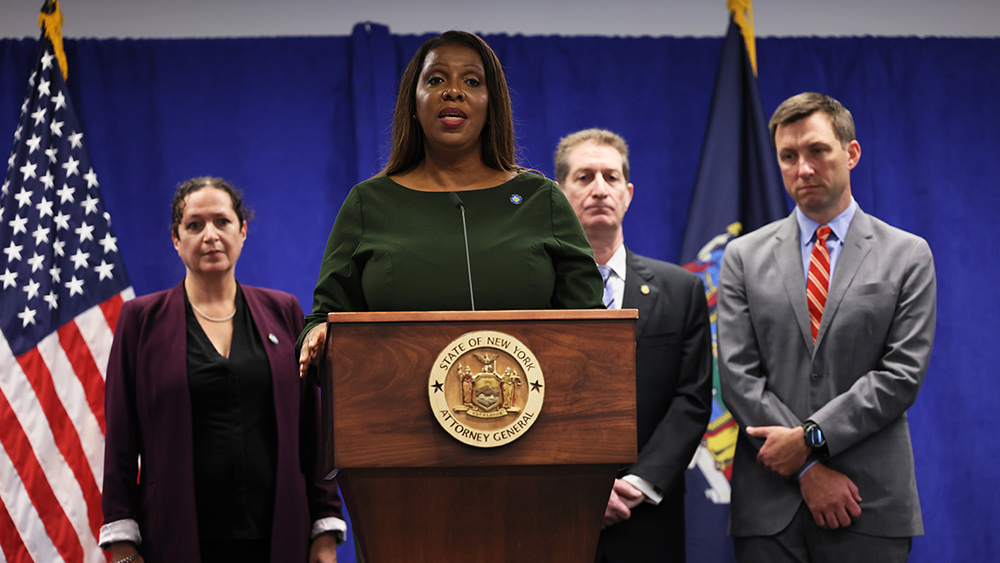 Parler
Parler Gab
Gab
- The FHFA accused New York AG Letitia James of falsifying records related to mortgage applications, alleging she misrepresented property details to secure favorable loan terms, including lower interest rates.
- The case centers on a five-unit building James purchased in 2001, which she repeatedly listed as a four-unit property in permit applications from 2001 to 2020, potentially avoiding stricter safety regulations and reducing mortgage costs.
- James allegedly claimed a Virginia property as her "principal residence" while serving as NY AG (which requires New York residency), raising accusations of mortgage fraud and false financial disclosures.
- Critics highlight James’ harsh prosecution of Trump for financial misconduct while her own alleged violations — similar to those punished severely for ordinary citizens — were dismissed as "minor errors." Legal experts argue this undermines public trust.
- The case fuels debates about selective justice and political bias, particularly given James’ prior anti-Trump pledges. The outcome may test whether powerful officials face equal accountability under the law.
Contradictions in Brooklyn: How a five-family home became four on paper
The referral, led by FHFA Director William Pulte, centers on discrepancies involving a five-family property James purchased in Brooklyn’s Lafayette Avenue in 2001. According to Department of Buildings records, the property was officially certified as a five-unit dwelling on a Certificate of Occupancy issued just weeks before her purchase. Yet, James’ subsequent permit applications — for renovations as late as 2020 — listed the building as “four family,” a categorization that alters regulatory oversight and lending criteria. The distinction is no triviality. A five-unit building falls under stricter safety mandates, such as additional fire protection measures, under New York’s C2 zoning classification. James’ filings, however, placed it under C3 (for three-four units), circumventing stricter requirements. Documents show this misrepresentation persisted across applications from 2001 to 2020, including a signed statement from James or her agent affirming compliance with “applicable laws.” Federal investigators allege the error was neither accidental nor minor. “These contradictions were repeated across multiple applications, suggesting a pattern of falsification,” Pulte wrote, noting the misrepresentation could have lowered her mortgage interest by 1% under the Home Affordable Modification Program (HAMP), saving thousands annually. “There is clear intent here,” said one legal expert familiar with the case, noting the differing penalties for similar actions taken by ordinary homeowners.Dual residences and a “principal residence” deception
The referral further accuses James of listing a 2023 property purchase in Virginia as her “principal residence” — a designation critical to securing favorable mortgage terms — while simultaneously holding her office as NY AG, which requires residency in New York. The Virginian property, valued at $218,780, was processed through a power of attorney granted to a relative, Shamice Thompson-Hairston, and involved a mortgage application that listed her father as a “co-signer,” then erroneously labeled the pair “husband and wife” in documentation dating back to the 1980s. “This is not a clerical error,” Pulte emphasized, citing statutes suggesting potential charges of wire fraud, bank fraud and false statements to a financial institution. The timing adds political nuance: the application coincided with James’ high-profile trial against the Trump Organization for inflating property valuations, which she called “a gross breach of the law.” Her recent targeting of Trump’s tariff pause further inflamed partisan tensions, with the AG’s referral overlapping with ongoing scrutiny of potential insider trading links in the White House.The hypocrisy factor: “No one is above the law”—except you?
James’ mantra — “No one is above the law, not even the president”—echoed for years as her office pursued Trump for alleged financial misconduct. Now, her own legal troubles invite a reciprocal gaze. “This is a person who prosecuted Trump for everything short of ripping a label off a mattress,” noted George Washington University Law Professor Jonathan Turley on Fox News, referencing charges in her civil case against Trump’s organization. “Applying the Letitia James standard, this looks straightforwardly criminal.” Critics argue the Brooklyn discrepancies alone, which persisted for over two decades, exemplify double standards. Ordinary property owners face swift penalties for similar missteps. In 2020, a landlord in Queens faced $100,000 fines after underreporting units, triggering mandatory fire guards and tenant rent strikes. Yet James’ filings, according to the referral, received nothing more than a “minor error” brush-off from the Department of Buildings. “This isn’t just about technicalities,” said real estate attorney Jesse Gribben, who represents renters in unlawful occupancy cases. “When public officials break the laws they enforce, it erodes faith in the system entirely.”The cost of selective justice
As the DOJ weighs the referral, the case transcends individual accountability—it tests the principle of impartiality in law enforcement. Letitia James’ exploits echo broader anxieties about politically motivated prosecutions, amplified by her campaign-trail pledges to “take down Donald Trump.” Whether the referral culminates in charges remains uncertain, but the optics are undeniable: a prosecutor once hailed as a champion of justice now at risk of becoming its collateral damage. In the words of Trump, who has branded James “a totally corrupt politician,” the story serves as a cautionary tale: in a game of fraud accusations, vultures often become the prey. For New Yorkers — and Americans — the question lingers: Can the legal system punish powerful actors equally, or will the law always bend to who holds the pen? Sources include: ZeroHedge.com WhiteCollarFraud.com NYPost.comTensions persist as Russia and Ukraine remain at odds over ceasefire prospects
By Belle Carter // Share
WEF’s Klaus Schwab and his wife Hilde under investigation for ethical and financial MISCONDUCT
By Ramon Tomey // Share
FBI affidavit: Teen’s plot to assassinate Trump linked to Ukrainian operation
By Ramon Tomey // Share
U.S.-China trade war shows no signs of cooling amid conflicting claims, economic toll rises
By Willow Tohi // Share
Flaws in landmark vaccine study spark renewed autism-link debate
By Willow Tohi // Share
Governments continue to obscure COVID-19 vaccine data amid rising concerns over excess deaths
By patricklewis // Share
Tech giant Microsoft backs EXTINCTION with its support of carbon capture programs
By ramontomeydw // Share
Germany to resume arms exports to Israel despite repeated ceasefire violations
By isabelle // Share










